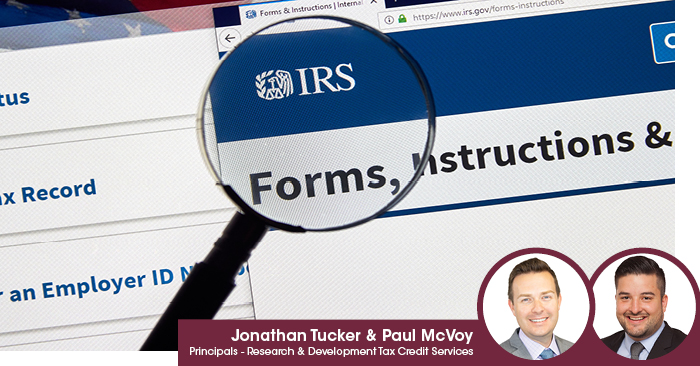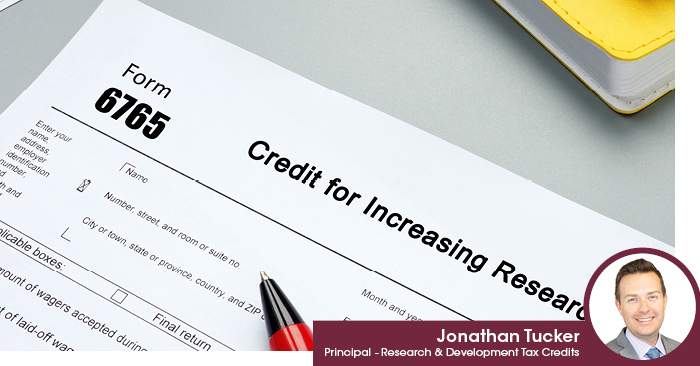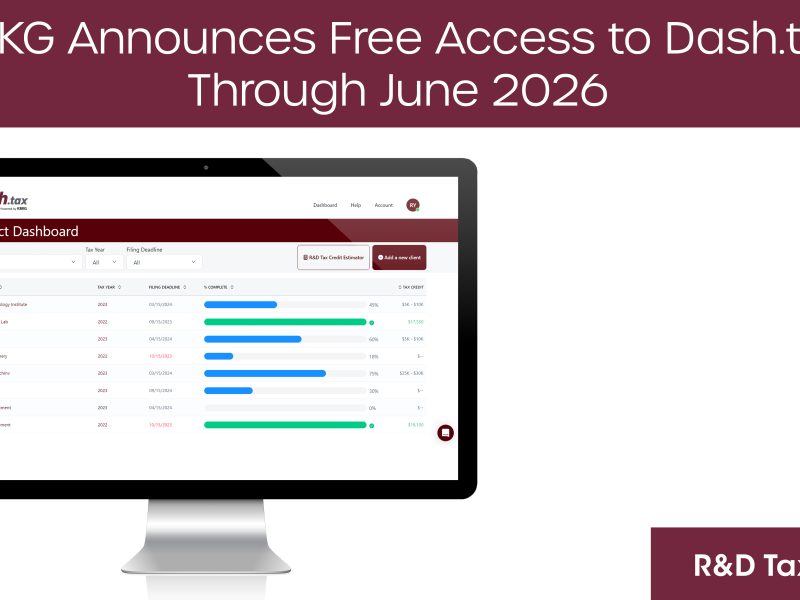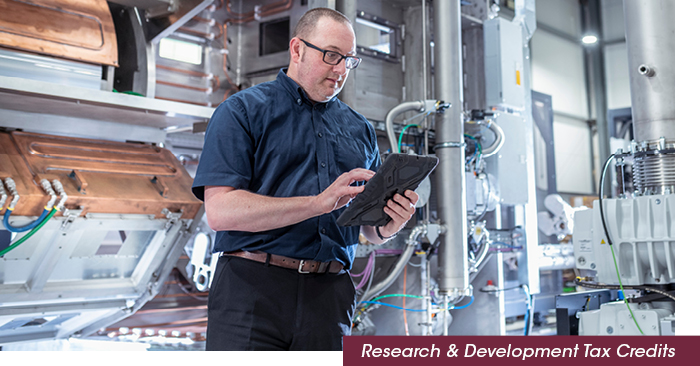Are R&D Tax Credits Available in California?
Yes. The state of California provides the Research and Development (R&D) Tax Credit very similar to the federal version including the definition of qualifying research. Below are some of the differences between the federal and California R&D Tax Credits. Only qualified research expenses (QREs) incurred in California are eligible for the California research credit.
There are two methods with which the California research credit may be calculated: Regular Credit method and Alternative Incremental Credit method.
The Regular Method credit is equal to the sum of the following:
- 15% of QREs that exceed a base amount, which is calculated by applying a fixed-base percentage to the average annual gross receipts for the four prior years, plus
- 24% of basic research payments
Under the Alternative Incremental Credit method, the credit is calculated by taking the sum of the following. Note that an election to use this method applies to all tax years following the election.
- 1.49% of QREs in excess of a base amount computed using a fixed-base percentage of 1%, but not in excess of a base amount computed using a fixed-base percentage of 1.5%;
- 1.98% of QREs in excess of a base amount computed using a fixed-base percentage of 1.5%, but not in excess of a base amount computed using a fixed-base percentage of 2%; and
- 2.48% of QREs in excess of a base amount computed using a fixed-base percentage of 2%.
Unused California research credits must be applied to the earliest tax year possible and then may be carried forward indefinitely, as opposed to federal credits which must be carried back one year and carried forward twenty.
California R&D Tax Credit Case Study
A San Francisco Company develops software used by its clients. It had never before claimed the R&D credit for the development activities of its software programmers. This project involved a four-year study with a three-year look back.
The Company qualified for the federal R&D Tax Credit of $330,000 and an additional $247,500 in California state R&D Tax Credit.
|
FEDERAL
|
CALIFORNIA
|
|||||
|
Year
|
Total QREs
|
Credit
|
Total QREs
|
Credit
|
||
|
2021
|
$1,300,000
|
$130,000
|
$1,300,000
|
$97,500
|
||
|
2020
|
$900,000
|
$90,000
|
$900,000
|
$67,500
|
||
|
2019
|
$650,000
|
$65,000
|
$650,000
|
$48,750
|
||
|
2018
|
$450,000
|
$45,000
|
$450,000
|
$33,750
|
||
| Total | $3,300,000 | $330,000 | $3,300,000 | $247,500 | ||
Get More Information About the R&D Tax Credit
The R&D Tax Credit, first enacted in 1981, has been one of the most valuable credits leveraged by companies. Every year, the R&D credit yields billions of dollars in federal and state benefits to companies engaged in qualifying research. This credit provides much-needed cash to hire additional employees, increase R&D, expand facilities, and more. Thousands of companies take advantage of the credit across several industries. » Learn More
Four-Part Test
Qualified research activities are defined by the four-part test outlined below
Technological in Nature
Activities must fundamentally rely on the principles of physical or biological science, engineering, or computer science.Permitted Purpose
Activities must be performed in an attempt to improve the functionality, performance, reliability, or quality of a new or existing business component.Eliminate Uncertainty
Activities intended to discover information that could eliminate technical uncertainty concerning the development or improvement of a product.Experimentation
All activities must include a process of experimentation including testing, modeling, simulating, and systematic trial and error.Research and Development Tax Insights

Why R&D Credit Claims Fail Without Documentation
08/08/2025Follow KBKG on Social Media Linkedin Facebook X-twitter Youtube Many businesses invest heavily in innovation, developing new technologies, improving systems, and solving technical problems. However, when it comes time to claim the Research and Development (R&D) Tax Credit, they often come up short because they fail to demonstrate a proper process of experimentation, which is … Read More

R&D Deductions for 2024? AICPA Pushes IRS for Urgent Guidance with Recommendations
08/07/2025Follow KBKG on Social Media Linkedin Facebook X-twitter Youtube By Jonathan Tucker and Paul McVoy | Principals – Research & Development Tax Credits The One Big Beautiful Bill Act (OBBBA) established that eligible small businesses may fully deduct domestic research costs capitalized in 2022-2024 via amended return. The problem is there’s currently no clear guidance … Read More

Choosing Between ASC and Regular R&D Credit Methods
08/01/2025This update was originally published on June 2, 2014. Follow KBKG on Social Media Linkedin Facebook X-twitter Youtube By Kevin Zolriasatain | Principal, Research & Development Tax Credits In a surprising, and long overdue modification to the Section 41 Research & Development tax credit, Treasury announced TD 9666 allowing taxpayer’s the opportunity to use the Alternative … Read More

Mastering the Business Component Test for R&D Tax Credit Success
07/28/2025Follow KBKG on Social Media Linkedin Facebook X-twitter Youtube When it comes to claiming the Research and Development (R&D) Tax Credit, understanding the Business Component Test is essential. This test serves as a cornerstone of eligibility, requiring that all qualified research activities be directly tied to a specific business component. Without this alignment, your R&D … Read More

New Refund Option for Minnesota R&D Credit Could Boost Cash Flow
07/25/2025Follow KBKG on Social Media Linkedin Facebook X-twitter Youtube By Paul McVoy and Michael Maroney | Research & Development Tax Credits On June 14, 2025, Minnesota Governor Tim Walz signed H.F. 9 into law, enacting a major update to the state’s R&D tax credit. Beginning in tax year 2025, businesses may elect to receive a … Read More

Manufacturing: Claiming R&D Credits for Improving Processes
07/24/2025Follow KBKG on Social Media Linkedin Facebook X-twitter Youtube When most people hear “Research and Development,” they imagine high-tech labs, futuristic prototypes, or scientists in white coats. In reality though, Research & Development (R&D) Tax Credits are just as available to the manufacturing floor as they are to the science lab. Many companies in manufacturing, … Read More

Section 174A and the 2024 Filing Dilemma for Eligible Small Businesses: Do You File or Amend?
07/21/2025Follow KBKG on Social Media Linkedin Facebook X-twitter Youtube By Jonathan Tucker | Principal, Research & Development Tax Credits As the dust settles following the passage of the One Big Beautiful Bill Act (OBBBA), many small businesses and their CPAs are navigating the mechanics of Section 174A, the newly enacted provision that restores the ability to … Read More

How to Claim R&D Credits After an Acquisition
07/17/2025Follow KBKG on Social Media Linkedin Facebook X-twitter Youtube Acquiring another company isn’t just a strategic move that grows market share or expands a portfolio of products. Acquisitions can also unlock significant tax advantages. One area that companies often overlook is the Research and Development (R&D) Tax Credit, which can help them gain significant value … Read More

KBKG Announces Free Access to Dash.tax Through June 2026, Empowering Tax Advisors to Claim R&D Tax Credits for Clients
07/14/2025PASADENA, Calif. – July 14, 2025– KBKG, a recognized leader in specialty tax solutions, announced its flagship Research & Development (R&D) tax credit software, Dash.tax, is now available at no cost to approved tax preparers through June 30, 2026. The limited-time initiative enables Certified Public Accountants (CPAs) and other tax professionals to access the full power of Dash.tax-an … Read More

Claiming the R&D Tax Credit for Failed Projects
07/10/2025Follow KBKG on Social Media Linkedin Facebook X-twitter Youtube Most businesses associate the Research and Development (R&D) Tax Credit with breakthrough innovations and completed projects. If a product launches successfully or a process gets optimized, it seems obvious to include those efforts in an R&D claim, but what happens when your project fails? Surprisingly, failure … Read More


